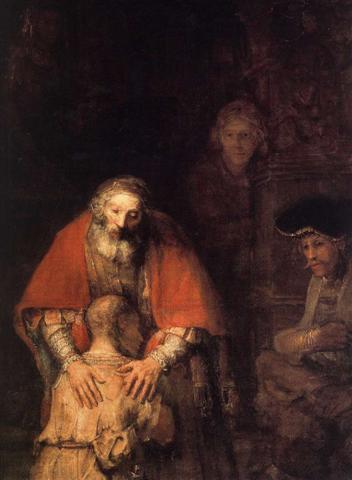 Normally I post my meditations on the Mass's Scripture readings on Sunday night, after people have heard their pastors preach. In my experience, that leaves me looking good enough in most cases. But not always. There are enough fine preachers out there, such as Fr. Philip Powell, OP, to put my sermonettes to shame. Today's Gospel, the parable of the prodigal son, brings out the best in many preachers. So I've decided to post my thoughts tonight, before I'm rightly ignored, leaving the Orthodox-Catholic debate over DD for tomorrow. A few, I know, will hear them.
Normally I post my meditations on the Mass's Scripture readings on Sunday night, after people have heard their pastors preach. In my experience, that leaves me looking good enough in most cases. But not always. There are enough fine preachers out there, such as Fr. Philip Powell, OP, to put my sermonettes to shame. Today's Gospel, the parable of the prodigal son, brings out the best in many preachers. So I've decided to post my thoughts tonight, before I'm rightly ignored, leaving the Orthodox-Catholic debate over DD for tomorrow. A few, I know, will hear them.St. Thomas Aquinas crafted his great Summa Theologiae on a theogonic model drawn from the sixth-century Pseudo-Dionysius: that of the going forth from and return of all things to God. Scholars call that "the exitus-reditus model." Now 'theogony' means 'origin of the divine'; and I use the associated adjective because the Pseudo-Dionysius thought of creation as destined to be 'divinized' through our theosis: a gift from the Father given through the Son and in the Holy Spirit. Theosis is indeed the purpose of this our life. (I am not now concerned with the sense in which we are to become God; I merely note that, in some sense, that is what life is about.) When Jesus speaks of the return of the prodigal son, he is giving us an extended metaphor for all that. But it works at two levels.
On one level, the exitus is creation itself, and reditus is simply the right ordering of creation to its source. Thus both would obtain even if man had never sinned. But Jesus is speaking more directly of our return to God from lives of sin. "All have sinned and have fallen short of the glory of God," but none of us baptized can get away with ignoring the call to attain glory anyhow by God's grace. Grace in the primary sense of the term is God himself, communicating his life to us as unmerited gift. Bestowed through baptism, that life changes us forever; we abide in the eternal whether we want to or not; hence, to sin and fall away from God leaves us worse off than we could ever have been had we never been called to be "partakers of the divine nature." So, given that we belong to the eternal anyhow, resuming the process of theosis by repenting and returning to God is elementary good sense.
But it's not just good sense, as if life were just about being a solid citizen. It is an occasion of joy. C.S. Lewis spoke of being "surprised by joy," and anybody who's read that book of his knows what he means. The ineffable joy we can experience even without knowing God explicitly is restored and deepened when we return to God after dissipating our primal joy in the darkness of willful ignorance and sin. I have experienced that. But it cannot be communicated in words, and it cannot be manufactured. It can only be facilitated by how we choose to respond to the father who awaits us in patient love and infinite mercy.
This Lent, let us remember that emptying ourselves through prayer, self-denial, and charity is just we would want to do if we recognized that what we so often feed on is pig fodder far from home. When we so empty ourselves, we are really resuming our walk on the path of theosis because we are removing obstacles to our interior journey back to God. His Spirit will propel us on the way. Soon or eventually, if we persevere, the joy of returning to our true home will be the fruit.

























